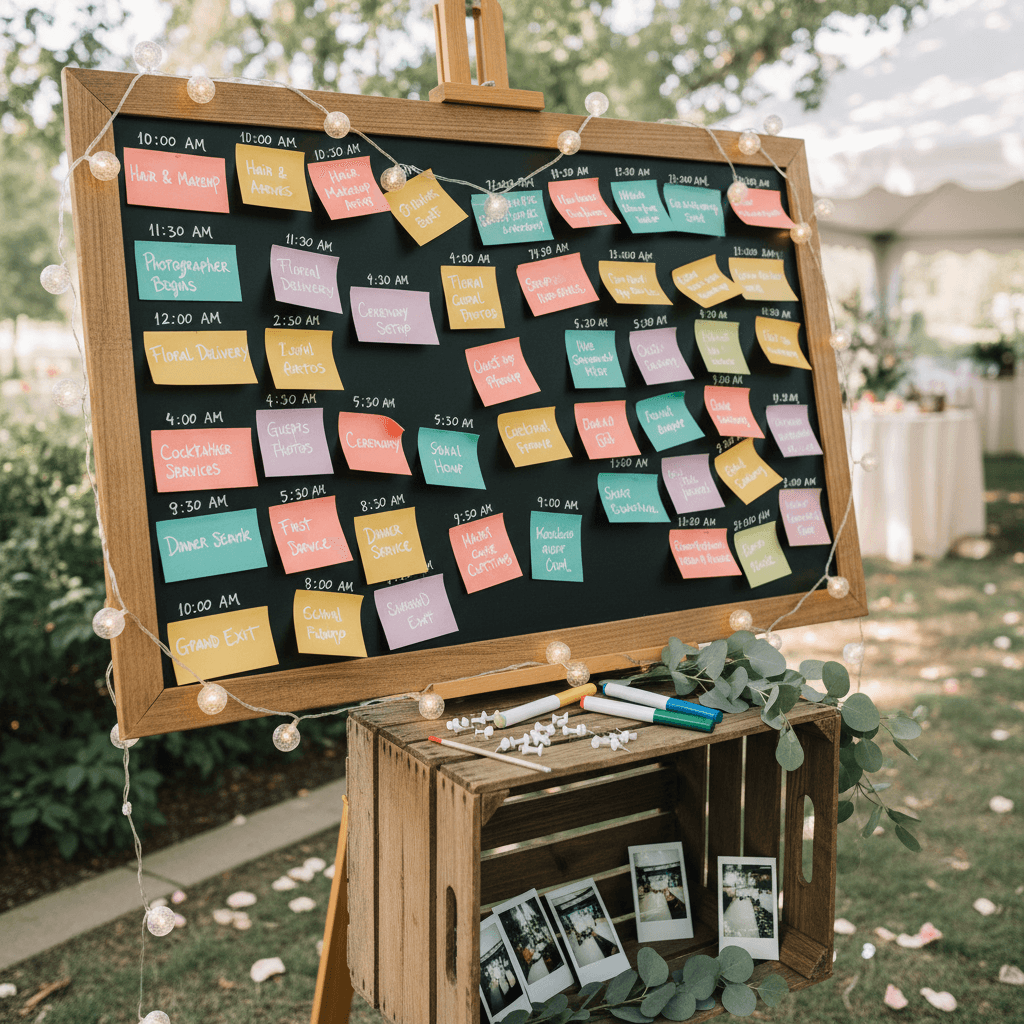Wedding Timeline Planning
Master Your Wedding Day Timeline
Wedding timeline planning represents the culmination of months of preparation, transforming your vision into a precisely coordinated celebration that flows seamlessly from morning preparations through the final farewell. A masterful wedding timeline balances the technical requirements of vendor coordination with the emotional needs of celebrating couples and their guests, creating an experience that feels both effortless and extraordinary.
Professional timeline planning goes beyond simple scheduling to create a strategic framework that anticipates potential challenges, optimizes guest experience, and ensures that every important moment receives appropriate attention and documentation. The most successful wedding timelines feel natural to guests while providing vendors with the structure they need to deliver exceptional service throughout the celebration.
Modern timeline planning must accommodate complex logistics including multiple vendor coordination, photography and videography requirements, family dynamics, and guest comfort considerations. This complexity requires sophisticated planning approaches that integrate all celebration elements into a cohesive schedule that supports both practical requirements and emotional objectives.
Strategic Timeline Development and Planning
Timeline development begins with identifying non-negotiable elements that affect all other scheduling decisions. Sunset timing for outdoor photography, venue curfew requirements, catering service capabilities, and religious ceremony specifications create framework constraints that guide all other timeline decisions. Understanding these fixed elements early in the planning process ensures that your timeline is realistic and achievable.
Backward planning methodology starts with desired end time and works backward through all necessary elements to determine optimal start times. This approach ensures that adequate time is allocated for each celebration phase while identifying potential timeline conflicts before they become day-of problems. Backward planning also reveals opportunities for timeline optimization that might not be obvious when planning forward chronologically.
Priority-based timeline allocation ensures that your most important celebration elements receive optimal timing and adequate duration. Couples who prioritize photography might schedule longer photo sessions during golden hour lighting, while those focused on guest experience might allocate more time to cocktail hour and reception socializing. This customization ensures that your timeline reflects your values and celebration priorities.
Advanced Timeline Tools
Create flawless wedding day schedules with professional timeline planning tools at planning.wedding/timeline – designed for comprehensive coordination and stress-free execution.
Wedding Timeline Examples
Explore these professional wedding timeline designs to inspire your own schedule planning. Each example demonstrates different approaches to time management, coordination strategies, and visual presentation.

Destination Timeline Folder

Digital Timeline Management

Elegant Timeline Chart

Vintage Parchment Style

Infographic Timeline Design

Visual Planning Board
Morning Preparation and Getting-Ready Coordination
Getting-ready timeline coordination sets the emotional tone for your entire wedding day while ensuring that all participants are prepared and relaxed before ceremony time. Hair and makeup scheduling must account for complexity variations, travel time between locations, and photographer arrival timing while building in buffer time for perfection touches and last-minute adjustments.
Bridal party coordination requires managing multiple personalities, preparation speeds, and timing requirements while maintaining group morale and excitement levels. Some wedding party members require more preparation time than others, and effective timeline planning accommodates these individual needs while ensuring group readiness. Clear communication about timeline expectations prevents preparation stress and ensures punctual ceremony arrival.
Vendor morning coordination includes florist delivery and setup, photographer arrival and equipment preparation, transportation confirmation, and venue final preparation checks. Each vendor has specific timing requirements that must be integrated into the overall morning schedule without creating conflicts or rushed service delivery. Professional coordination ensures that all morning activities support rather than compete with each other.
Photography and Videography Timeline Integration
Photography timeline planning requires understanding optimal lighting conditions, location accessibility, family group requirements, and couple portrait objectives while integrating these needs seamlessly into celebration flow. The best photography timelines capture all important moments while maintaining natural celebration pacing that doesn't feel interrupted by constant photo sessions.
Golden hour photography scheduling often represents the most challenging aspect of timeline coordination, as optimal lighting occurs during traditional cocktail hour or reception timing. Creative timeline planning might include first look sessions, pre-ceremony couple photos, or post-ceremony portrait sessions that maximize beautiful lighting while accommodating celebration flow and guest experience requirements.
Family photo coordination requires understanding group dynamics, mobility considerations, and relationship complexities while ensuring that all important combinations are captured efficiently. Detailed shot lists and family coordinator designation streamline photo sessions and prevent extended delays that could affect other timeline elements or guest patience levels.
Ceremony Timeline Precision and Flow
Ceremony timeline precision ensures that this most important celebration element unfolds with appropriate dignity and emotional impact while accommodating guest comfort and technical requirements. Processional pacing should create emotional buildup while maintaining guest attention, and ceremony length should balance meaningful content with guest comfort and attention spans.
Religious and cultural ceremony requirements often include specific timing elements, traditional practices, or ritual components that affect overall timeline planning. Understanding these requirements early in the planning process ensures that adequate time is allocated while respecting important traditions and family expectations that cannot be modified or rushed.
Post-ceremony transition planning coordinates receiving line logistics, photographer positioning, guest direction to cocktail areas, and vendor reset activities. This transition period often determines whether celebration flow feels smooth and organized or chaotic and confusing. Clear guest communication and professional coordination ensure seamless movement between celebration phases.
Reception Flow and Entertainment Coordination
Reception timeline planning creates the celebration's emotional arc through strategic pacing of dining, dancing, traditional elements, and social interaction. The most successful reception timelines feel organic and natural while ensuring that all planned elements receive appropriate attention and timing that maximizes guest engagement and enjoyment.
Meal service timing affects every aspect of reception planning, from cocktail hour duration to entertainment programming schedule. Understanding your caterer's service capabilities, courses timing, and dietary accommodation requirements helps create realistic timeline expectations while ensuring food quality and service standards that support overall guest experience objectives.
Entertainment programming integration coordinates live music, DJ services, traditional elements like toasts and cake cutting, and dancing segments into cohesive celebration flow. Each entertainment element should enhance rather than interrupt natural celebration energy, requiring careful attention to timing, transitions, and guest engagement levels throughout the reception.
Vendor Coordination and Service Integration
Comprehensive vendor timeline coordination ensures that all service providers can execute their responsibilities effectively while supporting overall celebration objectives and guest experience standards. This coordination requires understanding each vendor's specific timing requirements, setup needs, and service delivery capabilities while integrating them into seamless overall service delivery.
Setup and breakdown scheduling must accommodate shared space usage, equipment access requirements, and service delivery windows while minimizing guest impact and maintaining celebration atmosphere. Effective coordination prevents vendor conflicts while ensuring that all services are delivered at optimal quality levels without visible coordination stress or service interruptions.
Service transition management coordinates handoffs between different vendors and service phases while maintaining consistent guest experience standards. Professional coordination ensures that guests experience seamless service transitions rather than obvious vendor changes that could disrupt celebration atmosphere or create service gaps.
Complete Timeline Resources
Access comprehensive wedding timeline planning tools and expert coordination guidance at planning.wedding – your complete resource for flawless wedding day execution.
Contingency Planning and Timeline Flexibility
Weather contingency timeline planning prepares alternative schedules for outdoor ceremony delays, indoor ceremony modifications, or reception location changes that might affect overall celebration timing. Backup timeline scenarios should maintain celebration quality and guest experience while accommodating necessary adjustments for weather or other unexpected circumstances.
Buffer time integration throughout the timeline provides flexibility for minor delays, spontaneous moments, or unexpected situations without compromising overall schedule adherence. Strategic buffer placement prevents small delays from cascading into major timing disruptions that could affect vendor services, guest experience, or important celebration milestones.
Emergency adjustment protocols ensure that significant timeline changes can be implemented smoothly without creating guest confusion, vendor conflicts, or celebration disruption. Designated coordination personnel should understand adjustment procedures and have authority to make necessary timeline modifications while maintaining communication with all affected parties.
Guest Experience and Comfort Timeline Considerations
Guest comfort timeline planning ensures that celebration pacing supports enjoyment and engagement throughout the entire event duration. Understanding guest demographics, energy patterns, and comfort needs helps create timeline flows that work well for your specific guest group while maintaining appropriate celebration atmosphere and energy levels.
Age and mobility considerations affect timeline planning significantly, especially for celebrations including elderly relatives, young children, or guests with special needs. Ceremony duration, standing time requirements, reception scheduling, and departure timing should accommodate these needs while maintaining overall celebration quality and guest experience standards.
Transportation and departure coordination helps guests plan their evening while ensuring that celebration energy is maintained throughout the desired timeline duration. Clear communication about expected timing, transportation availability, and departure procedures prevents guest confusion while supporting appropriate celebration flow and conclusion timing.
Timeline Communication and Coordination Tools
Professional timeline communication ensures that all relevant parties understand their roles, timing requirements, and coordination responsibilities while providing easy reference tools for day-of execution. Digital timeline sharing allows real-time updates and ensures that all coordination personnel have access to current schedule information without confusion about versions or changes.
Vendor timeline distribution should include detailed coordination information, contact protocols, and adjustment procedures while maintaining appropriate privacy for couple and family planning elements. Professional timeline formats help vendors understand their role in overall celebration coordination while providing necessary logistical information for successful service delivery.
Day-of timeline management requires designated coordination personnel who understand timeline priorities, adjustment authority, and communication protocols. Effective coordination leadership ensures that timeline adherence supports rather than constrains celebration enjoyment while maintaining service standards and vendor coordination requirements throughout the entire wedding day experience.